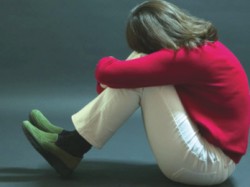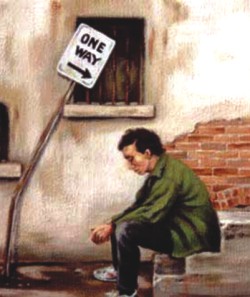|
Health
Depression
Dr. Mehtab Ghazi Rahman
 It is only human to feel sad, fed up or miserable at times when things are simply not going our way. Normally, these negative feelings only last for a week or two and we soon learn to cope with our failures or losses and carry on with life. Spending time with family or friends and a long chat over a good cup of tea with a close one usually makes us feel a lot better. However, some people find it extremely difficult to cope with their negative feelings, and instead of a week or two, they suffer for very long periods, however hard they try to cope with their emotions. When a person suffers emotionally for long periods so terribly that it starts affecting their lives in a negative way and develop a number of symptoms listed in this article, it could be that the person may be suffering from a medical disorder known as 'depression'. It is only human to feel sad, fed up or miserable at times when things are simply not going our way. Normally, these negative feelings only last for a week or two and we soon learn to cope with our failures or losses and carry on with life. Spending time with family or friends and a long chat over a good cup of tea with a close one usually makes us feel a lot better. However, some people find it extremely difficult to cope with their negative feelings, and instead of a week or two, they suffer for very long periods, however hard they try to cope with their emotions. When a person suffers emotionally for long periods so terribly that it starts affecting their lives in a negative way and develop a number of symptoms listed in this article, it could be that the person may be suffering from a medical disorder known as 'depression'.
So what exactly is 'depression'?
The feeling of depression is an extremely unpleasant feeling that lasts a lot longer than the short episodes of sadness that we all experience from time to time. Instead of feeling down and low for days to a maximum of a few weeks, people with depression suffer for months and even years. This is not something they do deliberately one theory suggests that depression is caused by an imbalance of brain chemicals (neurotransmitters) and therefore is a medical problem. A person with depression will have a number of symptoms they will complain about. These include feeling unhappy most of the time (but their mood gets slightly during the evening), loss of interest in life and hobbies, finding it difficult to cope with things at home and office as well as being unable to make simple decisions for themselves, fatigue, loss of appetite and weight, difficulty in going to sleep at night and then unintentionally waking up very early in the mornings. Depression takes a toll on one's relationships too - the illness causes an affected person to lose interest in intimacy and physical relationships with their partners, and their constant complaints about feeling hopeless and useless all the time often leads to communication problems with friends and family. Socially, the depressed person will stop hanging out with friends, feel irritable most of the day and when things get too overbearing, even contemplate suicide! Hence, depression is a very serious 'medical' condition that should never merely be passed off as a disease of the 'emotionally weak'; depression has a scientific basis and people who show signs of depression need to be seen by a qualified doctor in order for them to feel better and carry on with life.
It is interesting to note that a lot of patients with depression never realise they have the condition, as it comes on very gradually. Most people, especially in a country like ours where depression is not a well-recognised condition, decide to struggle on with life without seeking any help, since our cultural perception is that it is a disease that affects only the emotionally weak. This perception cannot be any farther from the truth. In fact, some of the strongest personalities in history, such as Winston Churchill, have suffered from depression during their lives. Some people try to cope with their feelings by immersing themselves into work, thus suppressing their feelings, but this only goes on to make them feel more exhausted and stressed when they deliberately avoid their feelings. These individuals soon develop somatic (bodily) symptoms such as headaches and sleepiness for which a doctor will find no obvious reason. Sometimes, these physical symptoms may be the first sign of depression in a lot of people.
 Of course, it is quite natural to feel depressed after a distressing event such as a death in the family, a divorce or after losing one's job, and this certainly does not imply that the person going through this bad patch is bound to suffer from depression. The natural reaction in a normal person would be to feel down for a number of weeks to a maximum of a month or two. The person will ponder about the reason for feeling so low for some time and want to speak to close relatives to help them cope with a misfortune, eventually coming to terms with what has Of course, it is quite natural to feel depressed after a distressing event such as a death in the family, a divorce or after losing one's job, and this certainly does not imply that the person going through this bad patch is bound to suffer from depression. The natural reaction in a normal person would be to feel down for a number of weeks to a maximum of a month or two. The person will ponder about the reason for feeling so low for some time and want to speak to close relatives to help them cope with a misfortune, eventually coming to terms with what has
happened and then continuing to carry on with life. Unfortunately, a person with depression will behave very differently… their sadness will be one that lasts more than six weeks, simply does not lift, and continues to get worse with time however hard they try to cope with it. What types of people have a high risk of suffering from depression?
People who have a poor social network or do not have close family or friends they can confide in are more likely to become depressed. A person who suffers from a terminal illness such as cancer may also show signs of depression, especially if they are finding it difficult to accept their diagnosis. Specific personality traits can also lead to development of depression, but the topic of personality disorders is so vast that this will be dealt with in a separate article. Studies have shown that alcoholics have a higher rate of depression, but the argument is whether alcohol leads to depression or depression leads the individual to turn to alcohol to help them cope with their feelings. Women are more likely to suffer from depression compared to men, and this is attributed to the fact that women have a greater amount of social responsibilities, such as looking after children, husband and in-laws alongside juggling the daily stresses at work. Finally, there is a genetic element to depression too data analysis has shown that depression tends to run in families. If a member in one's family has been diagnosed with depression, it is eight times more likely that another member of the same family will suffer from the same later on in life.
What should you do if you think you may have depression?
Having read the above, if you feel that you could be suffering from depression, ask yourself the following questions to confirm whether you indeed have symptoms suggestive of depression : 1. You feel sad a lot more than others and nothing seems to make you feel better even if you try your very best for over six weeks, 2. Your emotions drag you down so much that it affects your work & your personal relationships and stop you from enjoying things that you normally like doing (such as watching television or shopping), 3. You often feel that life is not worth living and that the word would be better off without you. If you answered 'yes' to these questions, try speaking to someone close to you and see if that helps you feel better. If not, you probably need to talk it over with a doctor who will be able to offer you a number of medical and non-medical therapies to make you feel much better.
If you feel depressed, how can you help yourself?
1. Disclose your feelings: Opening your heart to someone whom you can trust, talk over things and even cry your eyes out! Confiding and releasing one's emotions is the best way for our mind to heal itself when faced with distress or tragedy.
2. Participate in things you enjoy : Do something that you enjoy doing, such as taking a long walk on your own, reading a book or even dancing away to loud music behind closed doors. These activities not only keep you fit, but also takes your mind off the things that may be depressing you.
3. Eat well : It has been suggested by a number of psychiatrists that a good balanced diet is necessary to maintain a good mood. Fresh fruits and vegetables are particularly good to stabilise your mood.
4. Stop drinking alcohol : If you drink alcohol, you should stop drinking as soon as possible, not just because alcohol damages your liver, but also for the effect it has on your psychological well being. Drinking alcohol may temporarily help to drown your sorrows, but once the effect of alcohol has gone, it will make those sad feelings a lot worse, which may lead you to drink more and more, eventually turning you into an alcoholic.
5. Sleep : Try your best to sleep. Even if you find it difficult, just lay down on your bed, listen to some relaxing music and let your body relax. An article on sleeping well was recently published on the Star Magazine you could look the article up for some tips on improving your sleep.
6. Tackle the cause of the depression : Instead of hiding from the cause of the depression, tackle it face to face. A useful way to do is by self reflection write down what has been giving you sadness and jot down the ways you can tackle them. This method works wonders!
7. Keep your hopes up : Remember that you are not the only one going through this and that you will eventually come out of this trap with the right attitude and help. On a more positive note, depression can actually be a life changing experience it may make you a much stronger person and make you better able to cope with difficult situations in the future.
Rest assured that if the above tips do not help, there is always medical help available. There is no need to suffer from depression as it is a common and well recognised medical condition, and expert medical help is at hand. Once diagnosed, plenty of support is available through psychological and medical therapy, and these interventions have proved to be extremely successful. Keep your hopes high and smile that is half the battle against depression won already!
(Dr. Mehtab Ghazi Rahman is a Graduate of Medicine & Surgery (MBBS) and Human Bio-Medical Sciences BSc(Hons)* from the University of London. He is currently working as a Doctor for the National Health Service, United Kingdom)
Copyright
(R) thedailystar.net 2009
|
| |
